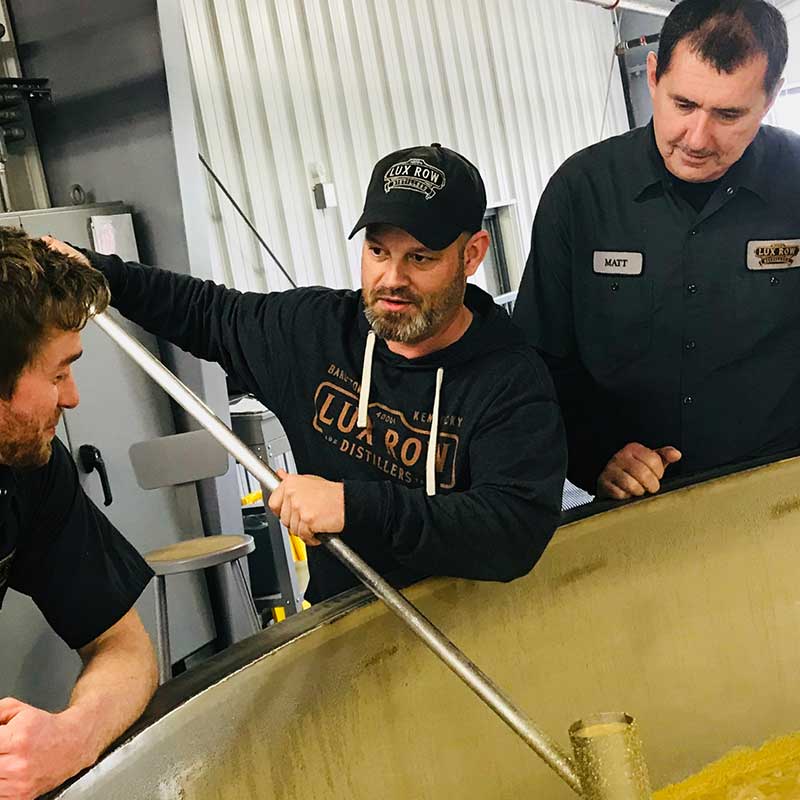What is a Master Distiller and How Do You Become One?

The History and Future of Bourbon
December 15, 2022
Lux Row Distillers Introduces Rebel 100 Rye
March 23, 2023What is a Master Distiller and How Do You Become One?

If you’re just getting into all things whiskey, you’ve likely come across a handful of terms that are a little unfamiliar up until this point. “Single barrel,” “double barrel,” “mash,” “Master Distiller” — the whiskey industry definitely comes with its own lingo.
To get you up to speed, here’s everything you need to know about who the Master Distiller is, what they do and, if you’re already in the know, how you can become one. (And, if you’re still a little confused about that single versus double barrel thing, you can learn more about that, here!)
Who is the Master Distiller?
The Master Distiller is a master of distillation. Distillation, or classical distillation, is the process of separating the components or substances from a liquid mixture using selective boiling and condensation, usually inside an apparatus known as a still. Of course, that’s a simplistic way to put it. Ultimately, Master distillers, whether in beer, whiskey, gin, or juice, need to know how to make great products, but they also need to understand their industry inside and out. They have to understand things such as weather, geography, chemistry and more, and how it affects the work they do.
Sometimes, the Master Distiller is the founder or head of a distilling company and creates their own recipes. In other cases, they are hired for their experience and expertise to continue the legacy of a recipe previously created. Inside each distillery is a Master Distiller whose background, qualifications, and precisely what they do every day differs slightly.
Regardless of those specifics, every Master Distiller is truly that: a master in their craft.
According to best-selling author and whiskey expert Fred Minnick, the term “Master Distiller” has been used since the 1800s. An 1867 definition of the term describes how the Master Distiller is intimately connected to their distillery’s entire operations.
How Do You Become a Master Distiller?
So how do you become a Master Distiller? If none of the above is news to you, you’re already on your way, as learning everything and anything you can about distilling is the first step to becoming one. However, knowledge alone does not make a Master Distiller. You also need those years of experience and hands-on know-how, which means working at a distillery and working your way up through the ranks. While, yes, you could potentially start your own distillery and name yourself a Master Distiller, if you truly want to master the art of distilling, it helps to learn from the pros and take advantage of the mentorship opportunities that come with working beneath someone who is already established.
As mentioned, there are no specific requirements or university degree required to work in distilling and become a Master Distiller. If you’re plotting a long-term career path and would like to best set yourself up for success in distilling, popular degrees that distilleries look for when hiring and degrees that will prove useful in such a career include business, biology, chemistry and chemical engineering.
Who’s the Master Distiller at Lux Row Distillers?
At Lux Row Distillers, we know the importance of having an expert at the helm who truly understands and is passionate about the craft of whiskey distilling. Our Master Distiller is John E. Rempe, a certified food scientist with more than two decades of experience and the creator of some of our favorite and award-winning Luxco brands and offerings. Thanks to John’s work, you can enjoy amazing whiskeys such as David Nicholson Reserve, Ezra 99, Daviess County Bourbons, Blood Oath, and the Rebel 10-Year Single Barrel Kentucky Straight Bourbon Whiskeys.
To see the full distillation process in person, and learn more about the distilling industry, visit us for a tour at our location along the Kentucky Bourbon Trail in Bardstown, Kentucky. In the meantime, discover all the Lux Row Distillers whiskeys when you check out what’s currently available at your favorite spirits store.

